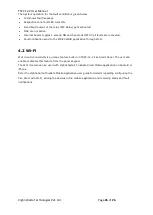
TSFC 12-2 User Manual
Vighnaharta Technologies Pvt. Ltd. Page
18
of
26
2.5
Do’s and Don’ts
2.5.1
Do’s
1.
DO
t
ake responsibility for your fire systems
Taking responsibility means being proactive and intentional about managing the programme and
knowing what it takes to maintain a high level of reliability your fire systems.
2. DO
understand how your fire system works
Do you know the difference between the Trouble signal and the Supervisory signal in your Fire
Alarm system? What’s the correct response to these different signals? What button should you
press?
It’s important that you find ways to learn how the system operates so
that you are
prepared to interact with the equipment in the case of an emergency. I encourage you to make an
effort to understand how your particular fire systems are designed to operate.
3. DO
know the inspection, testing and maintenance requirements
Testing must be performed on a periodic basis to verify the functionality of the fire system
including simulating the events and conditions that are to be expected during an emergency
situation. One must also remember those maintenance tasks are necessary to keep the system in
good operating condition. These tasks include both periodic preventative maintenance activities
and making the required repairs revealed by the inspection or testing of the system components
like DSPA, siren.
4. DO
train your people
Certain people must receive varying degrees of training depending upon their role. Some must
understand how to operate the system so they can interact with the system when something
happens. Others must simply be ready to react appropriately when an event happens. If you
dec
ide that more training is needed, don’t forget to turn to your fire system service provider for
help.
5. DO
pay attention to record keeping
There are several different types of records that are important to maintain. Every Fire Alarm
System should have wh
at is called a “Record of Completion” document that is maintained up
-to-
date with any and all system changes made over the life of the system. Other important records
include built drawings, user manuals, written sequence of operation and servicing charts.
2.5.2
Don’ts
1. DON’T
ignore reoccurring problems
Some fire systems are plagued by reoccurring trouble conditions that just don’t seem to go away
on their own. Common intermittent troubles include ground faults, circuit problems, battery faults
and device failures. An experienced fire system service technician can track down the root cause of
the problem and know how to make the necessary repairs. Resist the temptation to ignore these























